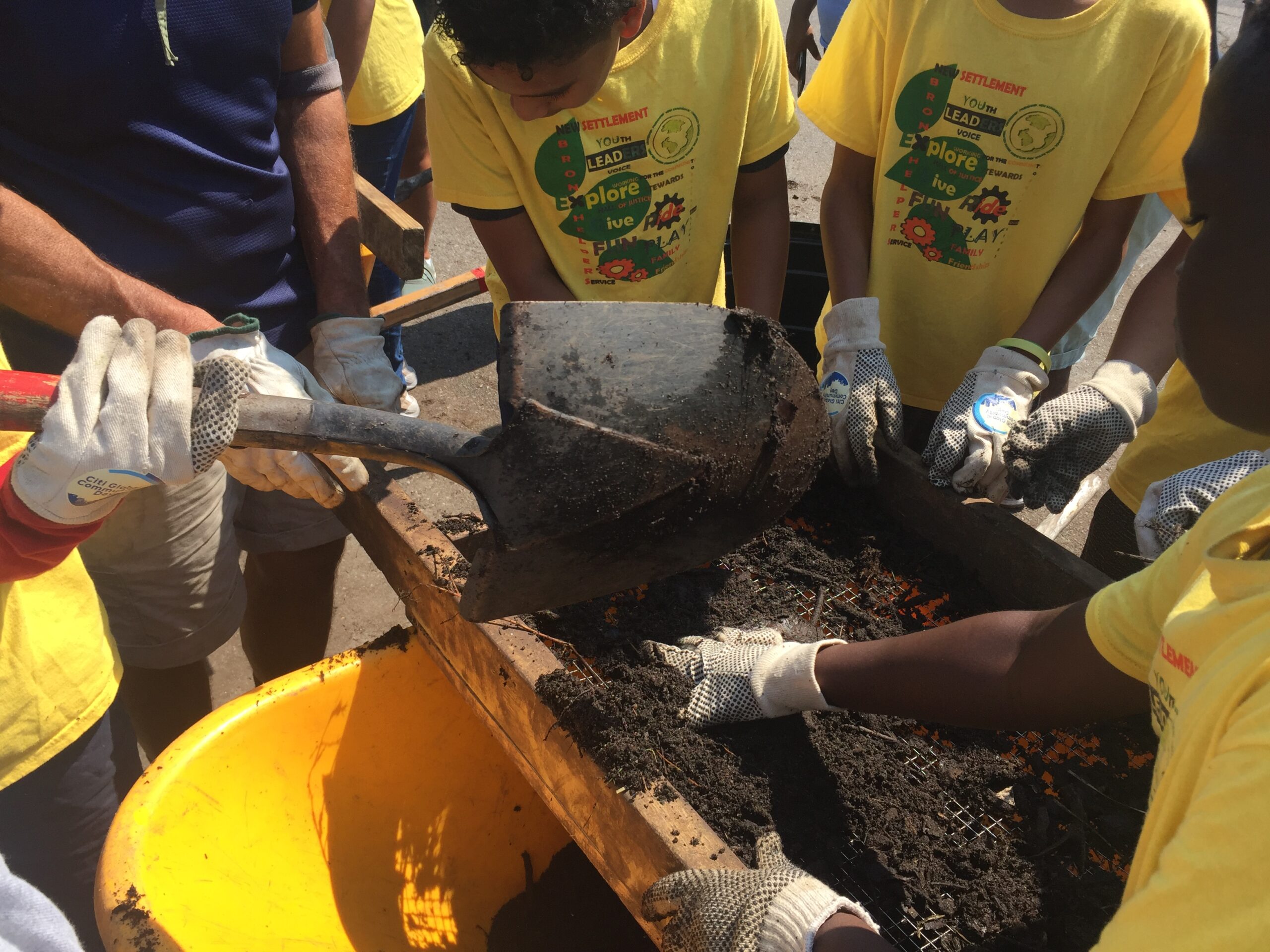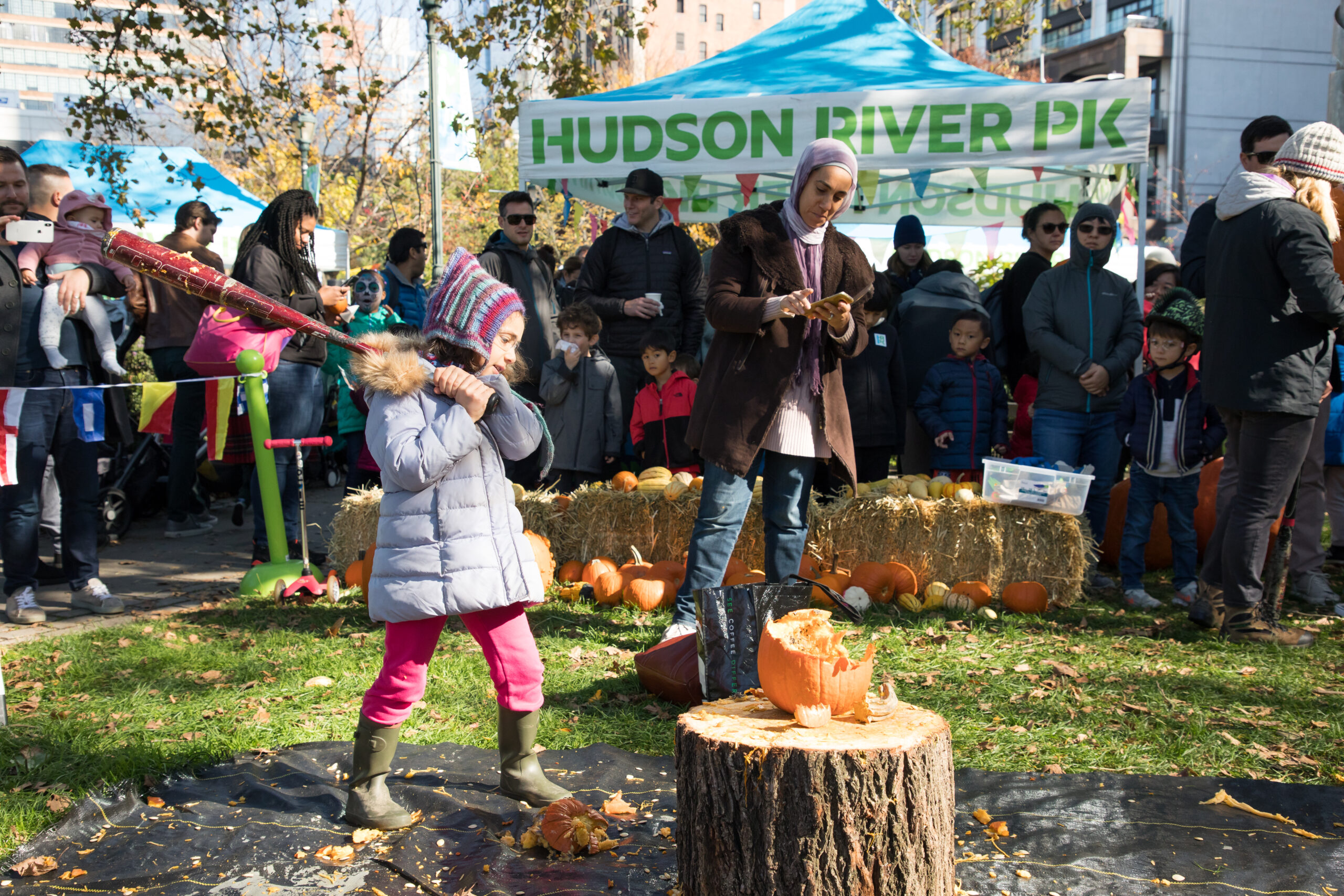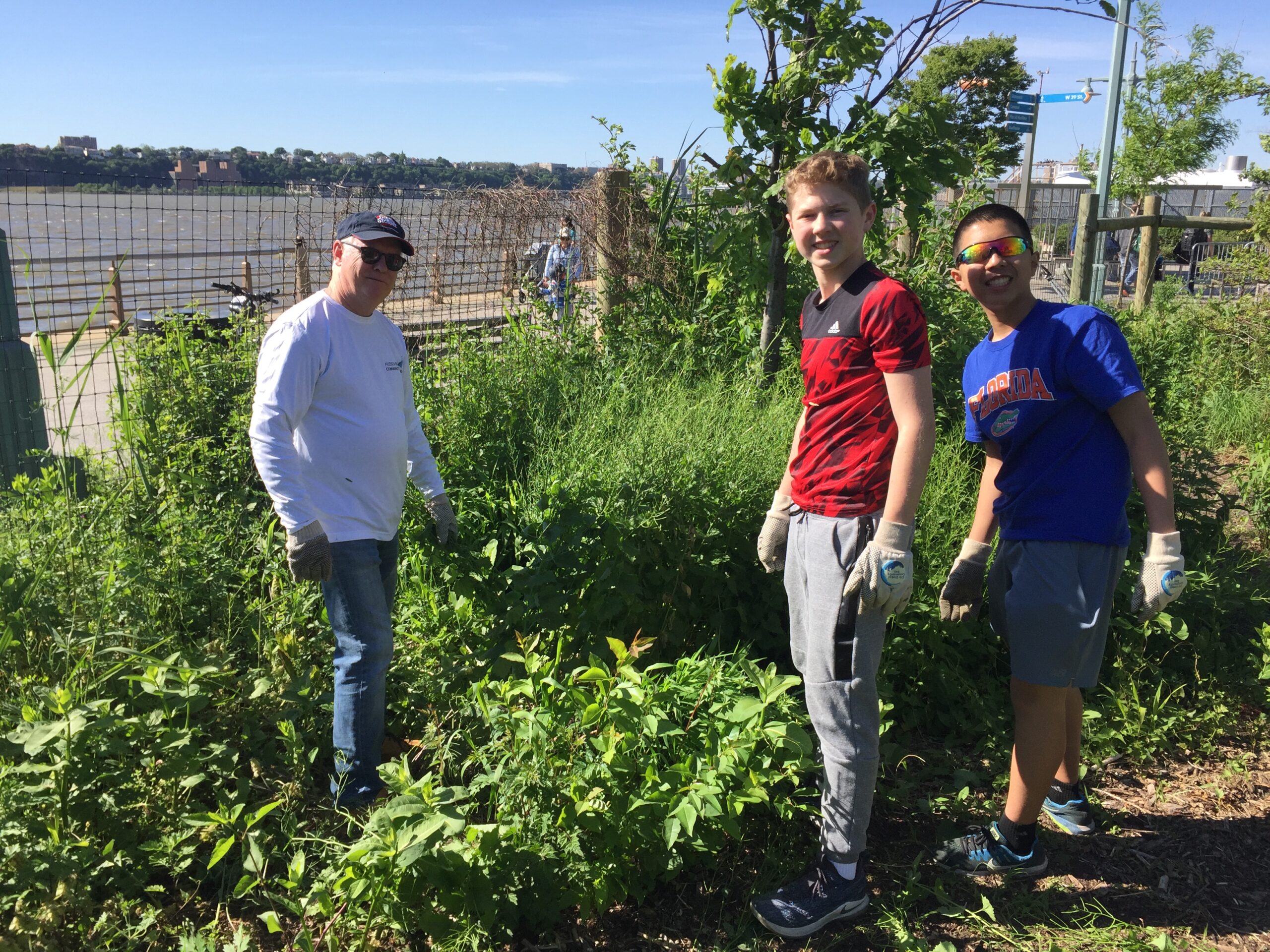Hudson River Park’s Community Compost Program invites local residents to participate in simple yet effective actions to support sustainability in their neighborhood. The Community Compost Program is an initiative designed to help divert NYC’s organic waste from landfill and reduce carbon emissions that harm the environment. Since the Park’s earliest composting efforts in 2015, the Program has grown into a Park-wide operation turning over several hundred thousand pounds of food scraps and yard waste into compost a year.
Visit our new Community Compost Tracker.
Click below to jump to an area on the page:
What is Compost?
Compost is organic waste, like food and yard scraps, that has been broken down into a nutrient-rich, soil-like material. This breakdown process occurs through the work of many living microorganisms and macro-organisms like bacteria and worms, respectively. Compost is spread throughout our four-mile riverfront Park to enrich lawns and flowerbeds. Major benefits of composting include:
- Composting food scraps helps recycle organic waste and return it back into the Earth
- Nutrient rich compost helps plants absorb water and protect against pests and disease
- Composting in Hudson River Park helps reduce our carbon footprint—NYC waste is sent to landfills outside of city limits in trucks and on barges, fueled by oil, which release carbon dioxide into the atmosphere
- Helps support NYC’s zero waste goals—a third of all NYC waste that is exported to landfills is food or yard scraps
- Helps reduce methane gas emissions that contribute to climate change—organic waste that breaks down in landfills releases methane, a greenhouse gas that can retain 25 times more heat than carbon dioxide
What We’re Doing in HRPK
- 10 food scrap drop-off sites are available to the public throughout the Park’s four-mile footprint open from 7:00 AM–7:00 PM every day.
- In 2023, HRPK diverted a total of over 470,000 pounds of organic waste from landfills, including 350,000 pounds of horticultural waste and 120,000 pounds of food scraps.
- The Park hosts compost-focused education programs and workshops, including the annual Pumpkin Smash, for the community to learn about best composting practices. In 2020, despite scaling down this event due to COVID-19, we collected 1,000 pounds of pumpkin that will turn into compost!
- Overall, Hudson River Park’s Community Compost enables the Park to self-sustain our green spaces, offsetting carbon dioxide emissions and costs associated with purchasing soil and fertilizer
Community Compost Tracker
We’re now tracking the organic food waste that the Park community brings to our 10 drop off locations. Visit our Community Compost Tracker to learn more about the collective impact your food scraps are having in the Park. Metrics are updated regularly, and on this interactive page you can:
- View how many pounds of community compost were collected at each location
- Compare community participation monthly and annually
- See the Park’s running total for community compost diverted from landfills
Community Compost Program News
- Community Conversations: Meet David, Hudson River Park’s Compost Technician, and find out what amazing work goes into keeping our Community Compost Program running smoothly
- Compost Tip: Store your compost in your freezer in a reusable shopping bag or container. It’s a great place to keep your organic waste until you’re ready to drop it off in the Park because it eliminates smell! Bonus: Composting will keep your trash from getting stinky and filling up so quickly
- New Food Scrap Bins: Our new food scrap bins include reusable liners that eliminate the use of disposable trash bags plus, they’re designed to keep away pests. Find a drop-off location near you and look for the brown bins with a white apple core icon!
How to Compost
The easiest way you can support our Community Compost Program is to collect your food scraps at home! Different composting facilities are able to break down various types of organic waste; here’s what Hudson River Park accepts at our drop-offs:
Yes
- Fruit & vegetable scraps
- Coffee grounds and filters
- Teabags
- Grains
- Eggshells & nuts
- Dried & cut flowers
No
- Diapers
- Compostable bags, utensils or containers
- Dairy products
- Meat, fish and bones
- Fats, grease and oils
- Plastic, metal or glass
Compost Bin Locations
Create a compost receptacle and store it in your freezer. This could be a reusable container, reusable shopping bag, or even a brown paper bag. Keeping compost in your freezer is a great way to eliminate smell that otherwise develops as your food scraps begin to decompose.
When you’re ready to drop off your compost, swing by any of Hudson River Park’s 10 drop-off sites. Our bins are available every day from 7:00 AM–7:00 PM at the following locations:
- Pier 25 at N Moore St. near the Pier 25 Play Area
- Pier 40 at Houston St. near the Leroy Street Dog Park
- Pier 46 at Charles St.
- Pier 51 at Horatio St. near the Pier 51 comfort station
- 14th Street Park at the southwest corner of 15 St. and 10 Ave.
- Chelsea Waterside Park at the 23 St. and 11 Ave. entrance
- Pier 66 at W 26 St.
- HRPK’s Compost Center at W 34 St.
- Pier 84 at W 44 St. near the Pier 84 Dog Park
- Pier 96 Boathouse at W 55 St.
This program was made possible by generous donations and support from Chris Fiore and L Brands Inc., NYC Department of Sanitation and Council Member Corey Johnson.
Get Involved
Hudson River Park’s Community Compost Program is growing, and you’re invited to take part in this expanding initiative! Here are some ways you can lend a helping hand:
- Volunteer: Become a Compost Volunteer and help to process and survey organic waste in HRPK’s Compost Center. Work side-by-side with our horticulture team and in this hands-on role.
- Become a Sponsor: As a Sustainability Sponsor you help support not only our Community Compost Program, but community education and sustainability initiatives throughout the Park. Sponsors receive exciting opportunities to promote their brand and engage their employees in the Park.
Resources
Hudson River Park’s Community Compost Program Impacts
- 2023 Waste Report
- 2023 Waste & Compost Data
- 2022 Waste Report
- 2022 Waste & Compost Data
- 2021 Waste Report
- 2020 Community Compost Program Report
- 2020 Community Compost Data
- 2019 Community Compost Program Report
- 2018 Community Compost Program Report
- 2018 Compost Cartegraph Report


